Yue Tan
Sherman
Open-o3 Video: Grounded Video Reasoning with Explicit Spatio-Temporal Evidence
Oct 23, 2025Abstract:Most video reasoning models only generate textual reasoning traces without indicating when and where key evidence appears. Recent models such as OpenAI-o3 have sparked wide interest in evidence-centered reasoning for images, yet extending this ability to videos is more challenging, as it requires joint temporal tracking and spatial localization across dynamic scenes. We introduce Open-o3 Video, a non-agent framework that integrates explicit spatio-temporal evidence into video reasoning, and carefully collect training data and design training strategies to address the aforementioned challenges. The model highlights key timestamps, objects, and bounding boxes alongside its answers, allowing reasoning to be grounded in concrete visual observations. To enable this functionality, we first curate and build two high-quality datasets, STGR-CoT-30k for SFT and STGR-RL-36k for RL, with carefully constructed temporal and spatial annotations, since most existing datasets offer either temporal spans for videos or spatial boxes on images, lacking unified spatio-temporal supervision and reasoning traces. Then, we adopt a cold-start reinforcement learning strategy with multiple specially designed rewards that jointly encourage answer accuracy, temporal alignment, and spatial precision. On V-STAR benchmark, Open-o3 Video achieves state-of-the-art performance, raising mAM by 14.4% and mLGM by 24.2% on the Qwen2.5-VL baseline. Consistent improvements are also observed on a broad range of video understanding benchmarks, including VideoMME, WorldSense, VideoMMMU, and TVGBench. Beyond accuracy, the reasoning traces produced by Open-o3 Video also provide valuable signals for test-time scaling, enabling confidence-aware verification and improving answer reliability.
BlindGuard: Safeguarding LLM-based Multi-Agent Systems under Unknown Attacks
Aug 11, 2025Abstract:The security of LLM-based multi-agent systems (MAS) is critically threatened by propagation vulnerability, where malicious agents can distort collective decision-making through inter-agent message interactions. While existing supervised defense methods demonstrate promising performance, they may be impractical in real-world scenarios due to their heavy reliance on labeled malicious agents to train a supervised malicious detection model. To enable practical and generalizable MAS defenses, in this paper, we propose BlindGuard, an unsupervised defense method that learns without requiring any attack-specific labels or prior knowledge of malicious behaviors. To this end, we establish a hierarchical agent encoder to capture individual, neighborhood, and global interaction patterns of each agent, providing a comprehensive understanding for malicious agent detection. Meanwhile, we design a corruption-guided detector that consists of directional noise injection and contrastive learning, allowing effective detection model training solely on normal agent behaviors. Extensive experiments show that BlindGuard effectively detects diverse attack types (i.e., prompt injection, memory poisoning, and tool attack) across MAS with various communication patterns while maintaining superior generalizability compared to supervised baselines. The code is available at: https://github.com/MR9812/BlindGuard.
Multi-Stage Verification-Centric Framework for Mitigating Hallucination in Multi-Modal RAG
Jul 27, 2025Abstract:This paper presents the technical solution developed by team CRUISE for the KDD Cup 2025 Meta Comprehensive RAG Benchmark for Multi-modal, Multi-turn (CRAG-MM) challenge. The challenge aims to address a critical limitation of modern Vision Language Models (VLMs): their propensity to hallucinate, especially when faced with egocentric imagery, long-tail entities, and complex, multi-hop questions. This issue is particularly problematic in real-world applications where users pose fact-seeking queries that demand high factual accuracy across diverse modalities. To tackle this, we propose a robust, multi-stage framework that prioritizes factual accuracy and truthfulness over completeness. Our solution integrates a lightweight query router for efficiency, a query-aware retrieval and summarization pipeline, a dual-pathways generation and a post-hoc verification. This conservative strategy is designed to minimize hallucinations, which incur a severe penalty in the competition's scoring metric. Our approach achieved 3rd place in Task 1, demonstrating the effectiveness of prioritizing answer reliability in complex multi-modal RAG systems. Our implementation is available at https://github.com/Breezelled/KDD-Cup-2025-Meta-CRAG-MM .
CyberV: Cybernetics for Test-time Scaling in Video Understanding
Jun 09, 2025



Abstract:Current Multimodal Large Language Models (MLLMs) may struggle with understanding long or complex videos due to computational demands at test time, lack of robustness, and limited accuracy, primarily stemming from their feed-forward processing nature. These limitations could be more severe for models with fewer parameters. To address these limitations, we propose a novel framework inspired by cybernetic principles, redesigning video MLLMs as adaptive systems capable of self-monitoring, self-correction, and dynamic resource allocation during inference. Our approach, CyberV, introduces a cybernetic loop consisting of an MLLM Inference System, a Sensor, and a Controller. Specifically, the sensor monitors forward processes of the MLLM and collects intermediate interpretations, such as attention drift, then the controller determines when and how to trigger self-correction and generate feedback to guide the next round. This test-time adaptive scaling framework enhances frozen MLLMs without requiring retraining or additional components. Experiments demonstrate significant improvements: CyberV boosts Qwen2.5-VL-7B by 8.3% and InternVL3-8B by 5.5% on VideoMMMU, surpassing the competitive proprietary model GPT-4o. When applied to Qwen2.5-VL-72B, it yields a 10.0% improvement, achieving performance even comparable to human experts. Furthermore, our method demonstrates consistent gains on general-purpose benchmarks, such as VideoMME and WorldSense, highlighting its effectiveness and generalization capabilities in making MLLMs more robust and accurate for dynamic video understanding. The code is released at https://github.com/marinero4972/CyberV.
Understanding the Information Propagation Effects of Communication Topologies in LLM-based Multi-Agent Systems
May 29, 2025Abstract:The communication topology in large language model-based multi-agent systems fundamentally governs inter-agent collaboration patterns, critically shaping both the efficiency and effectiveness of collective decision-making. While recent studies for communication topology automated design tend to construct sparse structures for efficiency, they often overlook why and when sparse and dense topologies help or hinder collaboration. In this paper, we present a causal framework to analyze how agent outputs, whether correct or erroneous, propagate under topologies with varying sparsity. Our empirical studies reveal that moderately sparse topologies, which effectively suppress error propagation while preserving beneficial information diffusion, typically achieve optimal task performance. Guided by this insight, we propose a novel topology design approach, EIB-leanrner, that balances error suppression and beneficial information propagation by fusing connectivity patterns from both dense and sparse graphs. Extensive experiments show the superior effectiveness, communication cost, and robustness of EIB-leanrner.
ZAHA: Introducing the Level of Facade Generalization and the Large-Scale Point Cloud Facade Semantic Segmentation Benchmark Dataset
Nov 07, 2024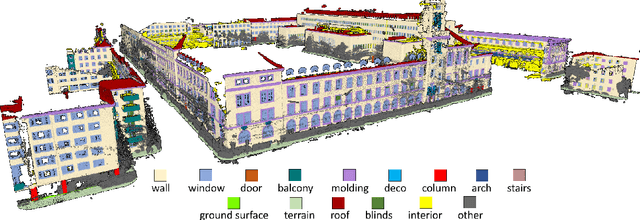
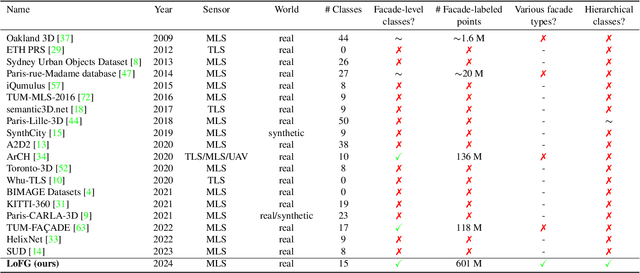
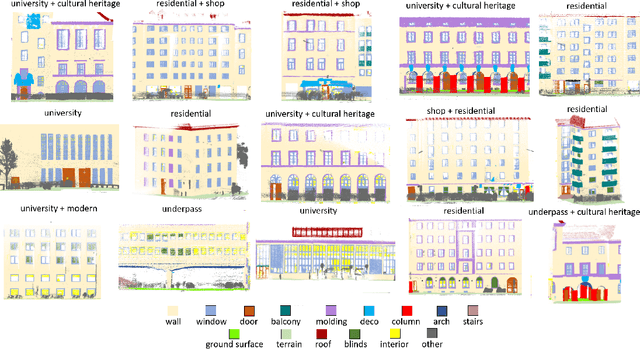
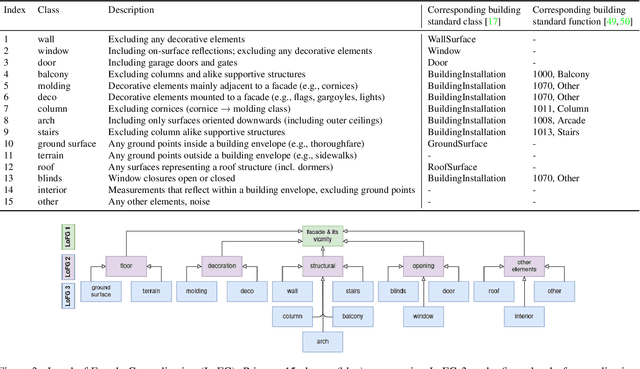
Abstract:Facade semantic segmentation is a long-standing challenge in photogrammetry and computer vision. Although the last decades have witnessed the influx of facade segmentation methods, there is a lack of comprehensive facade classes and data covering the architectural variability. In ZAHA, we introduce Level of Facade Generalization (LoFG), novel hierarchical facade classes designed based on international urban modeling standards, ensuring compatibility with real-world challenging classes and uniform methods' comparison. Realizing the LoFG, we present to date the largest semantic 3D facade segmentation dataset, providing 601 million annotated points at five and 15 classes of LoFG2 and LoFG3, respectively. Moreover, we analyze the performance of baseline semantic segmentation methods on our introduced LoFG classes and data, complementing it with a discussion on the unresolved challenges for facade segmentation. We firmly believe that ZAHA shall facilitate further development of 3D facade semantic segmentation methods, enabling robust segmentation indispensable in creating urban digital twins.
Influence-oriented Personalized Federated Learning
Oct 04, 2024



Abstract:Traditional federated learning (FL) methods often rely on fixed weighting for parameter aggregation, neglecting the mutual influence by others. Hence, their effectiveness in heterogeneous data contexts is limited. To address this problem, we propose an influence-oriented federated learning framework, namely FedC^2I, which quantitatively measures Client-level and Class-level Influence to realize adaptive parameter aggregation for each client. Our core idea is to explicitly model the inter-client influence within an FL system via the well-crafted influence vector and influence matrix. The influence vector quantifies client-level influence, enables clients to selectively acquire knowledge from others, and guides the aggregation of feature representation layers. Meanwhile, the influence matrix captures class-level influence in a more fine-grained manner to achieve personalized classifier aggregation. We evaluate the performance of FedC^2I against existing federated learning methods under non-IID settings and the results demonstrate the superiority of our method.
Classifying point clouds at the facade-level using geometric features and deep learning networks
Feb 09, 2024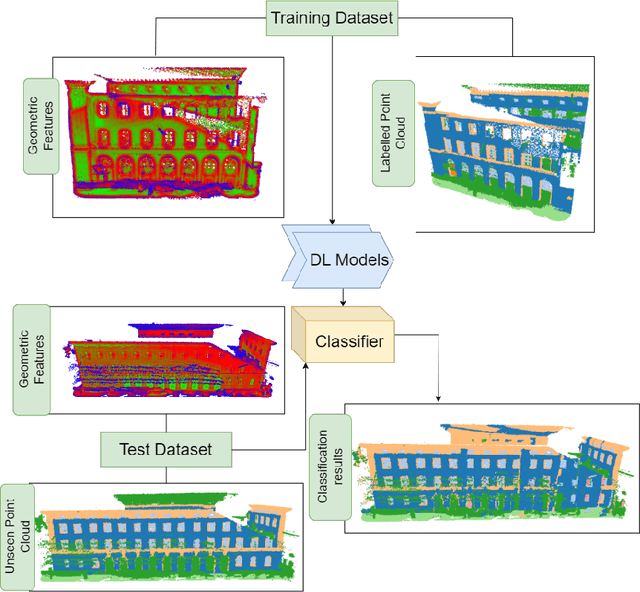
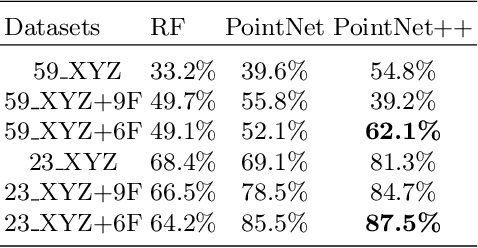
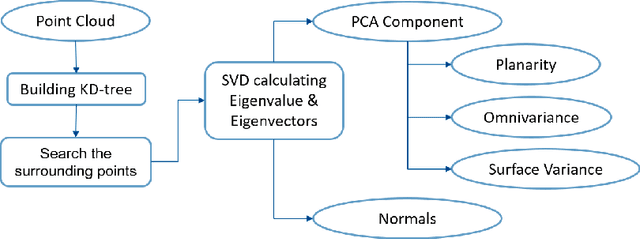
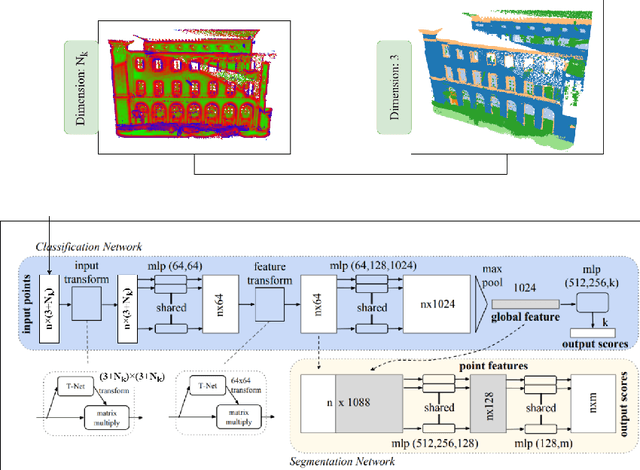
Abstract:3D building models with facade details are playing an important role in many applications now. Classifying point clouds at facade-level is key to create such digital replicas of the real world. However, few studies have focused on such detailed classification with deep neural networks. We propose a method fusing geometric features with deep learning networks for point cloud classification at facade-level. Our experiments conclude that such early-fused features improve deep learning methods' performance. This method can be applied for compensating deep learning networks' ability in capturing local geometric information and promoting the advancement of semantic segmentation.
Federated Learning on Non-IID Graphs via Structural Knowledge Sharing
Nov 23, 2022



Abstract:Graph neural networks (GNNs) have shown their superiority in modeling graph data. Owing to the advantages of federated learning, federated graph learning (FGL) enables clients to train strong GNN models in a distributed manner without sharing their private data. A core challenge in federated systems is the non-IID problem, which also widely exists in real-world graph data. For example, local data of clients may come from diverse datasets or even domains, e.g., social networks and molecules, increasing the difficulty for FGL methods to capture commonly shared knowledge and learn a generalized encoder. From real-world graph datasets, we observe that some structural properties are shared by various domains, presenting great potential for sharing structural knowledge in FGL. Inspired by this, we propose FedStar, an FGL framework that extracts and shares the common underlying structure information for inter-graph federated learning tasks. To explicitly extract the structure information rather than encoding them along with the node features, we define structure embeddings and encode them with an independent structure encoder. Then, the structure encoder is shared across clients while the feature-based knowledge is learned in a personalized way, making FedStar capable of capturing more structure-based domain-invariant information and avoiding feature misalignment issues. We perform extensive experiments over both cross-dataset and cross-domain non-IID FGL settings, demonstrating the superiority of FedStar.
Federated Learning from Pre-Trained Models: A Contrastive Learning Approach
Sep 21, 2022



Abstract:Federated Learning (FL) is a machine learning paradigm that allows decentralized clients to learn collaboratively without sharing their private data. However, excessive computation and communication demands pose challenges to current FL frameworks, especially when training large-scale models. To prevent these issues from hindering the deployment of FL systems, we propose a lightweight framework where clients jointly learn to fuse the representations generated by multiple fixed pre-trained models rather than training a large-scale model from scratch. This leads us to a more practical FL problem by considering how to capture more client-specific and class-relevant information from the pre-trained models and jointly improve each client's ability to exploit those off-the-shelf models. In this work, we design a Federated Prototype-wise Contrastive Learning (FedPCL) approach which shares knowledge across clients through their class prototypes and builds client-specific representations in a prototype-wise contrastive manner. Sharing prototypes rather than learnable model parameters allows each client to fuse the representations in a personalized way while keeping the shared knowledge in a compact form for efficient communication. We perform a thorough evaluation of the proposed FedPCL in the lightweight framework, measuring and visualizing its ability to fuse various pre-trained models on popular FL datasets.
 Add to Chrome
Add to Chrome Add to Firefox
Add to Firefox Add to Edge
Add to Edge